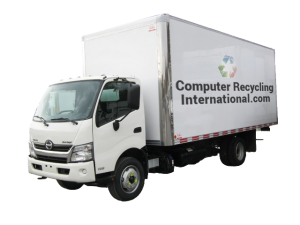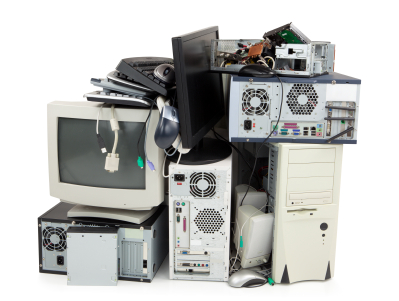1-833-945-2535

Toronto, Ottawa, Vancouver, Montreal
Electronics Recycling Toronto Center
Computer for Recycling in Toronto? 300 Drop-off points throughout
 Free Pick-up
Free Pick-up
Quick Electronic & Computer Pick-up in Toronto. Premium Quality Service.
Computers, televisions, screens, printers, accessories, electronics.
Toronto Computer Recycling Center

FREE Electronics Pickup in Toronto
600+ FREE Drop-Off Areas. IT Asset Disposition. Free E-waste, Electronics &
Computer Pickup in Toronto. Free HDD Certificate. Premium Quality Service.
Computer Recycling International, from father to son in the Computer Recycling for a better service. We very much take to heart recovery. professional collection service 100% free, computer pickup truck with our cube.
We accept all the IT equipment without exception!
Computers, Servers, Motherboards, PC Cards, Memory, Processors Mixed Cables, Hard Drives, Circuits, Power Supply, Notebooks, Boards, Switches, Routers, Réseautiques Materials, CD & DVD, Batteries, Heatsinks, Coolers, Cellular Phones, UPS, Transformers, Batteries shot, Adapters (Portable & Electronics), CRT & LCD, printers & all other computer and electronic equipment.
The Overconsumption of Computer and Electronics Equipment
Whenever we do not use our computer to the end of its life, or at least until it’s so slow that it no longer carries out basic functions, we are creating waste.
 The recycling process begins with sorting the electronic waste, as we do in our Computer Recycling Toronto York Center warehouses. Whether it be electronic devices, computer hardware or old computers, everything is salvaged. The recycling of e-waste in Canada becomes indispensable in preventing computer equipment from piling up in garbage dumps, or even worse, being burned in incinerators. The salvaging of these materials is necessary, as resources of the primary materials that go into making these products are limited. All this is possible, but it doesn’t happen on its own. As consumers, our role is to bring our old computers and electronics to drop-off points; businesses can easily call upon free collection services in Canada to come pick up their material.
The recycling process begins with sorting the electronic waste, as we do in our Computer Recycling Toronto York Center warehouses. Whether it be electronic devices, computer hardware or old computers, everything is salvaged. The recycling of e-waste in Canada becomes indispensable in preventing computer equipment from piling up in garbage dumps, or even worse, being burned in incinerators. The salvaging of these materials is necessary, as resources of the primary materials that go into making these products are limited. All this is possible, but it doesn’t happen on its own. As consumers, our role is to bring our old computers and electronics to drop-off points; businesses can easily call upon free collection services in Canada to come pick up their material.
What can we do to reduce the pollution we create? Individually, we can reduce the quantity of electronics products we consume, or even better, buy used equipment that may not have met the needs of its previous owner, but can still be very useful to us, as well as being much less expensive.
We as human beings have caused a great degeneration in the state of our planet through our excessive consumption, and now we must become conscious of the immense repercussions of our actions. Thus we can avoid further degradation of the Earth, which is at greater and greater risk of natural disasters, if we don’t act quickly. While our society of overconsumption has allowed incredible economic evolution, it has also created serious social problems. All too often, human beings are carried away by superficial values such as richness and material possession, which have become ideals in our society. What is more, through its various conditioning and advertising tactics, the media continually feed the consumer frenzy, convincing us to purchase things that are unnecessary or even harmful to the environment.
The study of psychology allows us to distinguish between our essential needs and our superfluous ones, helping us to consume less, and consume better. Sociology focuses particularly on the way individuals are influenced by their culture and family. And finally, economic perspective highlights the great changes in technology and productivity that have led to this abusive and exaggerated consumption.
Since the start of industrialization, new phenomena have become omnipresent in our societies; economic activity, consumption and technology have become important parts of humanity. We have only known certain phenomena, such as advertising and mass consumption, since very recently. These very often dictate our lifestyle habits, leading us to overconsumption. The phenomenon of overconsumption is defined not by the quantity of purchases, but by the emotional imbalance associated to the act of buying. At present, excessive advertising succeeds in creating needs, rather than allowing us to meet them. These ads encourage us to over-consume, while in other countries below the poverty line, people are dying of hunger. In fact, the gap between rich and poor only continues to grow. Everyone seeks their own material gain, abundance, happiness of the mass majority, even if it is to the detriment of others; this is the result of capitalism. More and more, the consumer society we live in is exposing its absurdity and its scope. There is a constant stream of new fashions, encouraging us to consume more; there is always a new “must-have” product. It is a vicious circle. The more we have, the more we want. The more money we have, the more we spend. Our needs are limitless, but the economic means for fulfilling them are not.
At the beginning of the 2oth century, there was an economic rise following the First World War; consumption of goods and services rose dramatically. As a result, the population started consuming differently. It is interesting to note that urbanization was partly responsible for this shift towards overconsumption. In addition, the media have also played a very important part in the development of consumption, presenting a multitude of new electronic products of all kinds – today, most of us own a laptop and a cellphone. Their goal is not to help us consume better, but rather to make us consume more, through various forms of mental conditioning and illusions created with the aim of increasing their own profit. Society then becomes a key player in the development of overconsumption, as it enslaves people by persuading them that a multitude of consumer goods will make them happy. It convinces people through subtle deception that happiness is only found in the overconsumption of material things. The consumer society favours values such as material possession and wealth as its ideal.
Human activities produce a wide variety of waste, and the elimination of this waste is an important factor in the protection of the environment. The salvaging of electronics and computer hardware is necessary, as these products are very toxic and correspond to 75% of the toxic products consumed by human beings, even though they only represent 4% of the overall weight of our waste. Salvage and recovery of these products is possible, but it cannot be done without time, energy and solid efforts. The recycling process begins with sorting items into blue recycling bins for electronic items.
Overconsumption can easily be compared to alcohol abuse. Here too, self-esteem comes into play, because many people may drink to boost their morale, which is ineffective because alcohol only helps us forget our problems. Furthermore, people often succumb to alcohol due to peer pressure and a desire to fit in. Alcohol abuse, however, is not the result of media conditioning and does not cause environmental imbalance.
 In order to fully understand the phenomenon of overconsumption, we can study it from three different perspectives: psychology, sociology, and economics. First of all, psychology allows us to decipher between basic needs and superfluous ones, helping the consumer avoid falling into the deceptive traps of the media. Making us feel valued as customers is one of the tricks the media use to convince us to buy a product – advertising often makes us think that buying this product will make us the envy of everyone around us; making us think that we’ll have better self-esteem when we buy any given product may be totally false. On top of it, people are often led to believe that if their personal belongings are bigger and better than their neighbours’, they will have a better self-image, but this too is entirely false, because it is not through material things that we gain self-esteem. Also, people are all too often led to conform to others, believing that their actions are good, while really they are motivated by passivity or by fear of being different. Thus, social conforms trap people into buying the same products as their friends and family, without even considering the real reasons for their purchases or the subsequent consequences to the environment.
In order to fully understand the phenomenon of overconsumption, we can study it from three different perspectives: psychology, sociology, and economics. First of all, psychology allows us to decipher between basic needs and superfluous ones, helping the consumer avoid falling into the deceptive traps of the media. Making us feel valued as customers is one of the tricks the media use to convince us to buy a product – advertising often makes us think that buying this product will make us the envy of everyone around us; making us think that we’ll have better self-esteem when we buy any given product may be totally false. On top of it, people are often led to believe that if their personal belongings are bigger and better than their neighbours’, they will have a better self-image, but this too is entirely false, because it is not through material things that we gain self-esteem. Also, people are all too often led to conform to others, believing that their actions are good, while really they are motivated by passivity or by fear of being different. Thus, social conforms trap people into buying the same products as their friends and family, without even considering the real reasons for their purchases or the subsequent consequences to the environment.
Next, the sociological point of view highlights society’s influence on individual consumption, and the social challenges of lowering abusive and superficial consumption. In order for people’s consumption habits to change, they must first be made aware of the implications of those habits. Also, the culture of each country plays a major part in determining the values of its society. Consequently, it is important to know ourselves well, in order to rediscover our most essential values.
Finally, economic perspective puts the focus on the huge increase in production that has led to this excessive consumption. The quest for profit has serious repercussions on people’s consumption, because its goal is to be the best, and thus companies will employ all the possible tools, traps and illusions to help them sell, with little or no consideration for consumers. In addition, supply and demand are very interesting concepts, because they are interrelated. The two mutually and positively influence one another – the greater the supply, the greater the demand, and vice-versa. The more we consume, the more new products are offered, and the more products that are offered, the more we consume. In short, we enter a cycle that causes us to always consume more and more.
First of all, learning through observation is a process through which an individual acquires new behaviour by observing another individual. Furthermore, beliefs are all thought patterns that influence our behaviour. We should all shift certain beliefs about the necessity of buying a multitude of electronic equipment, which makes our behaviour abusive and hazardous to the environment.
People of post-industrial societies generally do not put enough emphasis on production, they opt more towards consumption. Instead of focusing on what we need, businesses ask themselves what we could consume. Individuals are so alienated by the consumer society that they can no longer make wise consumer choices, due to their own psychological limitations.
We should, then, be very careful of what we consume, because the goal of businesses is not to help us, but rather to sell us goods and services.
Capitalism seeks profit above all, which implies selling many goods and establishing competition between companies. This competition then drives a drop in prices, which encourages a rise in sales. It’s not because we see well-priced products that we should buy them – these low prices are often due to the fact that the business does not pay an adequate salary to its employees, and pays little or no attention to the environment.
In conclusion, overconsumption generates an imbalance in human beings as well as on the planet itself, so it becomes very important to know the repercussions of our actions on ourselves, on others, and on the environment, and be vigilant not to fall into the many traps set by the media.
Computer Recycling International offers free computer recycling or electronic devices recycling. You do not have to pay anything at the time of collect or at anytime at all.
Also, what to know to recycle your laptop?
– Avoid disposing of your laptop, battery or power cable in the garbage bin: these are harmful electrical and electronic waste from equipment.
– If you no longer use your laptop, remove the batteries or accumulators: this helps to preserve the laptop from damage due in particular to the inflation of these elements, which is also inevitably a source of pollution.
– Be sure to keep it in an enclosed and sealed room, protected from the elements to avoid the circulation of dangerous substances.
– Like a desktop computer, a laptop can be upgraded and enhanced for reuse, as it can also be dismantled to recover what can still be reused.
- A re-use or recycling of a laptop must be carried out in accordance with the confidentiality of the user’s data.
Computer Recycling International guarantees a secure removal or destruction of your hard disks in accordance with the standards recommended by the competent authorities to ensure your safety. We have our Destruction of Hard Drives Certificat.
Recycling microprocessors
The microprocessor (CPU) can be related to the core of a computer (laptop or desktop). Constituting a set of integrated circuits, it makes it possible to carry out all the calculations and to process all the informations within the computer.
Microprocessor recycling is largely linked to the recovery of gold, since, as we have seen above, processors and memories are the richest sources of metals into the computer.
Small gold-coated pins can easily be removed from the microprocessor with a torch, holding the microprocessor over a container that collects the parts. Small tweezers such can also be used.
The pins are weighed and some hydrochloric acid is added to the container with them. This must be heated until it boils, allowing the gold pieces to float, which can then be recovered with filter papers.
The solidification of the particles is accelerated by the addition of sulfuric acid in small quantities and the silver chloride particles are pushed out of the solution by cold and dilution.
While the solution is still cold, after about an hour, it must be filtered. The precipitation is carried out with sodium metabisulphite. This is a step that can take up to 24 hours before the particles become visible. Finally, the solution is filtered to recover the gold powder to be sent to the refinery.
And recycling the motherboard in all this?
A motherboard also contains gold, but in very small quantities. For this reason, but also for health and safety reasons, the recovery of this precious metal should absolutely be left to the care of professionals. However, it is not uncommon for private individuals to put themselves at risk with that kind of goal.
The recovery of gold on the motherboard is done with an electrolytic cell. By placing the pins in the copper anode, it is dissolved in the emission of electric current in the cell and is deposited on the lead cathode. As for gold, it is subject to sedimentation.
After decantation of the bath, sulfuric acid is recovered as much as possible. The remainder is diluted, and acid is poured into the water to then filter the solution. A mixture of 35% hydrochloric acid and 5% bleach, in a proportion of 2 to 1, is used to dissolve what remains in the filter.
A second filtering operation is carried out so that the solution contains only gold chloride which must be precipitated, in particular with sodium metabisulphite powder, in order to obtain metallic gold. The latter must then be melted with a torch.
Whatever computer devices you have and which you no longer use, do not hesitate to fill the form on this page to entrust your computers and equipment to Computer Recycling Canada. We recycle all computer devices and offer to collect them for free pratically everywhere in Canada.
Recycling and recyclers: what are the standards to respect?
In terms of recycling of electronic products, there are three categories of recyclers:
– Primary recyclers;
– Downstream Recyclers of Material of Concern;
– Downstream Recyclers of equipment of no concern.
For each of these categories, recyclers are regularly audited and approved by the Recycler Qualification Office (RQO) under the Electronic Recycling Standards (ERS), developed by Electronic Product Stewardship Canada (EPSC) in 2014.
Very serious actions and programs
Recyclers meet the most stringent standards and that are determined by the type of activities that each category carries out. The R2: 2013 certification is a prerequisite for RQO approval to harmonize our standards internationally.
As a reminder, the Recycler Qualification Office acts as an auditor of the ERS for EPSC. The R2: 2013 standard is applicable to all organizations throughout the recycling chain, regardless of the size and location of recycling.
It should be noted that this is a facility-specific compliance certificate, but not a company. It applies to all activities related to the recycling of electronic products in connection with a physical address.
In addition to R2, the following Canadian minimum requirements are prerequisite for recyclers:
– Demonstrate active and continuous packaging in accordance with R2 and other EPSC requirements for materials;
– Not using child labor or prisoners;
– Compensation coverage for industrial accidents and general liability insurance ($ 2,000,000 for the primary recycler, $ 1,000,000 for the downstream recycler of material of concern, $ 500,000 for the recycler Downstream of non-disturbing equipment);
– Compliance with the reporting procedures of the ARPE for the reporting of incidents (for primary recyclers and downstream recyclers of equipment of concern);
– Financial assurance for closure plan based on maximum storage capacity (for primary recyclers);
– Comply with the scope of approval and downstream flow as defined by the RQO for material processing (for primary recyclers and downstream recyclers of material of concern);
– Use of authorized recyclers downstream (for primary recyclers).
Computers Recycling International apply these elements in the context of its activities and in the choice of its partners.
.
 Drop-off Points
Drop-off Points

